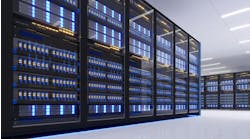Deploying colo as if it were cloud. That’s the big idea driving Equinix’ $335 million acquisition of Packet, which closed on Tuesday.
On the surface, the deal is all about bare metal cloud – dedicated servers that can be provisioned with cloud-like ease and speed. Equinix believes bare metal cloud will accelerate the growth of hybrid IT, enabling customers to rapidly deploy physical servers in an Equinix data center, and virtual servers in their favorite cloud platform.
“We intend to create a world-class, enterprise-grade bare metal offering across Platform Equinix that allows customers to rapidly deploy the physical infrastructure of their choice at software speed,” said Jon Lin, President, Americas at Equinix. “The two companies will develop a combined offering with rich security and networking features.”
The Packet deal also reflects the evolution of Equinix into a vendor of hardware and services. As a colocation specialist, the company historically offered space in cages and cabinets where customers could deploy their own IT equipment. As Equinix moves beyond “power, pipes and ping,” it will reshape the competitive landscape for other colo providers, further blurring the lines between traditional business models.
The addition of Packet also provides Equinix with deeper access to the developer community. CEO Zac Smith says the Packet brand is “focused on the millennial or Gen Z buyer, because they’re definitely going to be the boss in the next 10 years.” Buying Packet and its automation platform brings these cloud builders into Equinix’ data centers and customer pipeline.
The Power of Bare Metal as a Hybrid Enabler
The big trend driving the deal is the migration of corporate IT from legacy on-premises data centers to newer platforms that transform their IT operations. Public cloud is winning part of this business. Many enterprise customers remain wary of placing all their infrastructure in public clouds, but still covet the advantages of cloud.
For these customers, the answer is a hybrid cloud approach that divides their IT assets between the public cloud and a data center environment they control – either an on-premises facility or one operated by a colocation provider.
Network cabling fills fiber trays inside an Equinix data center. (Photo: Equinix)
Equinix is the world’s leading provider of colocation, with a focus on interconnections that move data traffic across network boundaries. This formula has allowed the company to create a digital infrastructure empire, with 200 data centers and 21 million square feet of space deployed across 52 markets. Equinix has historically focused on the core of the Internet, building clusters of data centers around major network intersections like Northern Virginia, Silicon Valley, Chicago and Dallas.
Packet was founded in 2014 to deliver fast, automated delivery of compute capacity for developers. Packet says it can deploy bare metal hardware in 8 minutes, providing customers with dedicated boxes on a rapid-deploy model, similar to spinning up virtual server instances on major cloud platforms – as opposed to the hours or days to deploy a typical dedicated server.
Equinix was already interested in the bare metal market, having developed an “edge metal” prototype. The purchase of Packet hastens this move, and illustrates the strategic value of bare metal servers.
“Bare metal is a more agile method for companies to deploy single tenant hardware compared to what many do when they purchase colocation and power, order and ship their own server hardware, and then employ technicians to set it up, test and activate,” said Lin. “Bare metal allows customers to skip these steps when their needs meet a set of standard server configuration requirements, and instead create these deployments more seamlessly, and on demand.”
Equinix Chief Product Officer Sara Baack (left) with Packet CEO Zac Smith. (Photo: Equinix)
Equinix Chief Product Officer Sara Baack said “a new reality where our customers can enter a new geography or market within minutes. No more waiting for your hardware to arrive on the loading dock … just provision and go.
“We’re working to enable enterprises to create private cloud infrastructures as quickly and easily as they can leverage public cloud resources, and a bare metal capability supports this focus,” said Baack. “We’ll leverage bare metal together with our robust portfolio of interconnection services to allow customers (including cloud providers themselves) to build, orchestrate, deliver and consume services across our global platform, which will exponentially increase the value of hybrid multicloud for all.”
Moving Beyond Traditional Product Boundaries
As corporate IT users grapple with a more complex set of options, data center providers are seeking to build platforms offering a wide range of assets and services.
This is best seen in the evolution of “Platform Equinix” and Digital Realty’s “PlatformDIGITAL” strategies. The competition between these two titans of the data center world illustrates the ongoing blurring of the boundaries between wholesale and retail colocation as providers seek to become a one-stop shop for IT infrastructure. Newer entrants like Cyxtera are being built from the ground up to offer nimble approaches to combining colo and services.
Lin said the move into bare metal is “absolutely” part of a strategic shift to offer more direct services to customers.
“This new capability will allow customers to mix and match a full range of owned or on-demand deployments at Equinix, customized to meet their unique needs for deployment in the cloud and at the edge on a market-by-market basis,” said Lin.
For carrier-neutral colocation providers like Equinix, offering services has historically been a tricky business. The concept of a level playing field is important, and many carrier-neutral facilities make a point of not offering services that could be perceived as competing with customers. Others seek to maintain distinct lines of business by product line. Colony Capital, for example, has separate business for retail colocation (DataBank) and wholesale data center space (Vantage).
As it begins selling server hardware, does the Equinix evolution create issues?
“Not really,” said Lin. “Equinix is the leading global interconnection and data center company and this will not change. Our platform strategy has been focused on continually anticipating our customers’ and the market’s needs – and adding capabilities beyond colocation and interconnection when it makes sense and increases value to our customers.”
“Bare metal gives our customers a new way to consume our value,” Baack said. “It doesn’t change our model ̶ it adds more flexibility and optionality to it. Our overriding goal is to enable customers to access both physical and virtual resources and capabilities as easily as possible through direct and secure interconnection.”
Bare metal creates “a new reality where our customers can enter a new geography or market within minutes. No more waiting for your hardware to arrive on the loading dock … just provision and go.”
Sara Baack, Equinix Chief Product Officer
Equinix is wagering that there’s a huge upside in enhancing its enterprise hybrid cloud, which will more than offset any risk of alienating customers from the service provider sector. Baack suggested that cloud providers might be among those taking advantage of the new bare metal offering.
In moving up the value chain, Equinix takes on some added capital expense in purchasing servers. It also adds the Packet team, which brings a fresh perspective based on building its business around developers and edge-focused workloads, like Sprint’s Curiosity platform for the Internet of Things.
“Zac and Jacob Smith bring an infectious energy and passion to the relationship,” Baack writes on the Interconnections blog. ” They have a clarity of vision and operate with a sense of community, a down-to-earth attitude and a spirit of fun that’s very much in harmony with our culture. Like Equinix, they run their business with a view of what’s possible and live to create new value for their customers.”






